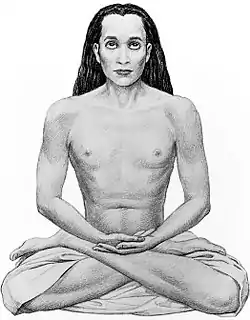Yogi
A yogi (Sanskrit, feminine root: yogini) is a term for a male who practices various forms of the path of Yoga, maintaining a steadfast mind, the process of transcending the lower self. These words are mostly reserved for advanced or daily practitioners. In contemporary English yogin is an alternative rendering for the word yogi. This word is often used to describe Buddhist monks or any lay person who is devoted to meditation.

The Shiva-Samhita text defines the yogi as someone who knows that the entire cosmos is situated within his own body, and the Yoga-Shikha-Upanishad distinguishes two kinds of yogins: those who pierce through the "sun" (surya) by means of the various yogic techniques and those who access the door of the central conduit (sushumna-nadi) and drink the nectar.[1]
Related pages
- Yogini
References
- The Shambhala Encyclopedia of Yoga, Shambhala Publications, Boston, 2000 p.350
Sources
1-2. Feuerstein, Georg. The Shambhala Encyclopedia of Yoga, Shambhala Publications, Boston, 2000 p. 321, 350.
This article incorporates text from the public domain 1907 edition of The Nuttall Encyclopædia.